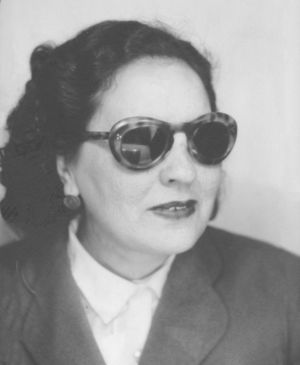Birth of Sultana Daoud
Algerian singer, musician, and composer Sultana Daoud, 1957. Via Wikimedia Commons.
Sultana Daoud, also known as Reinette l'Oranaise, was an Algerian singer, oud player, and composer of Arab-Andalus music. For the majority of her career, she was a representative of the Hawzi folk music of Algeria.
Daoud was born (according to most sources) on April 25, 1915, in Tiaret, Algeria, the daughter of a Moroccan rabbi. At two years old, she became blind as a result of smallpox. She later studied at the Algiers school for the blind, where she learned braille and chair weaving or caning.
At her father's initiative, Daoud was introduced to Arab-Andalus music by Saoud l'Oranais, also known as Messaoud El Medioni, a band leader and proprietor of the original Café Oran, a famous "café-concert" in the Jewish quarter of Oran where musical shows were held. Oran, the port city in northwestern Algeria from which El Medioni hailed, is known as the birthplace of Raï folk music. He nicknamed her "Reinette l'Oranaise" ("Queenie from Oran," a translation of her name "Sultana" into French, with the same surname as his own stage name — l'Oranais). Under his tutelage she learned several instruments, including the darbouka, the mandolin, and the oud, as well as many songs from the Arab-Andalus and Raï (a form of Algerian folk music) traditions. They moved to Paris together in 1938 to open a café-concert but, at El Medioni's suggestion, Daoud returned to Algeria. (A few years later, still in France, El Medioni was killed by the Nazis.)
Daoud joined El Medioni's orchestra and recorded her first album, inscribing herself into the musical tradition of Oran. Oran's musical scene featured many Jewish musicians during this time, including Maurice El Medioni, Saoud's nephew, a pianist sometimes regarded as the father of Algerian pop music. At age 26, Daoud saw success, playing twice a week at Radio Algier alongside the most popular musicians of the Chaabi (a form of Algerian folk music) and Andalusian repertoires. She also performed at both Jewish and Muslim religious celebrations such as weddings, circumcisions, and birthdays. As a Jewish woman, she was even allowed to sing in an all-male orchestra, something that was forbidden for Muslim women.
Like most Algerian Jews, Daoud left her country in 1962 following its independence after the eight-year Algerian war of independence that began in 1954. She returned to France, where she performed in restaurants and private parties for the North African Jewish community in Paris. Overall, however, Daoud was nearly forgotten after her departure from Algeria. In 1985, her legacy experienced a revival as French curiosity in Maghrebi culture and its musical heritage grew. She returned to the stage, performing in a musical film and participating in a documentary dedicated to her life story. She died on November 17, 1998, in Paris, at age 83. She is remembered as a legend of the Judeo-Arabic and Chaabi musical traditions.
Sources:
“Reinette l’Oranaise.” Wikipedia, June 6, 2024. Accessed August 18, 2024. https://fr.wikipedia.org/wiki/Reinette_l%27Oranaise.
“Saoud l’Oranais.” Wikipedia, July 25, 2024. Accessed August 18, 2024. https://fr.wikipedia.org/wiki/Saoud_l%27Oranais.
“The Brave Blind Girl Who Turned into More than a Little Queen: Reinette l’Orainese.” Mapamundi Musica. Accessed August 18, 2024. https://www.mapamundimusica.com/en/musicbeforeshabbat/the-brave-blind-girl-who-turned-into-more-than-a-little-queen-reinette-lorainese/.
World Jewish Congress. “The Blind Luminary of Arabo-Andalusian Music.” World Jewish Congress. Accessed August 18, 2024. https://www.worldjewishcongress.org/en/legacy-of-jews-in-MENA/The-Blind-Luminary-of-Arabo-Andalusian-Music.



